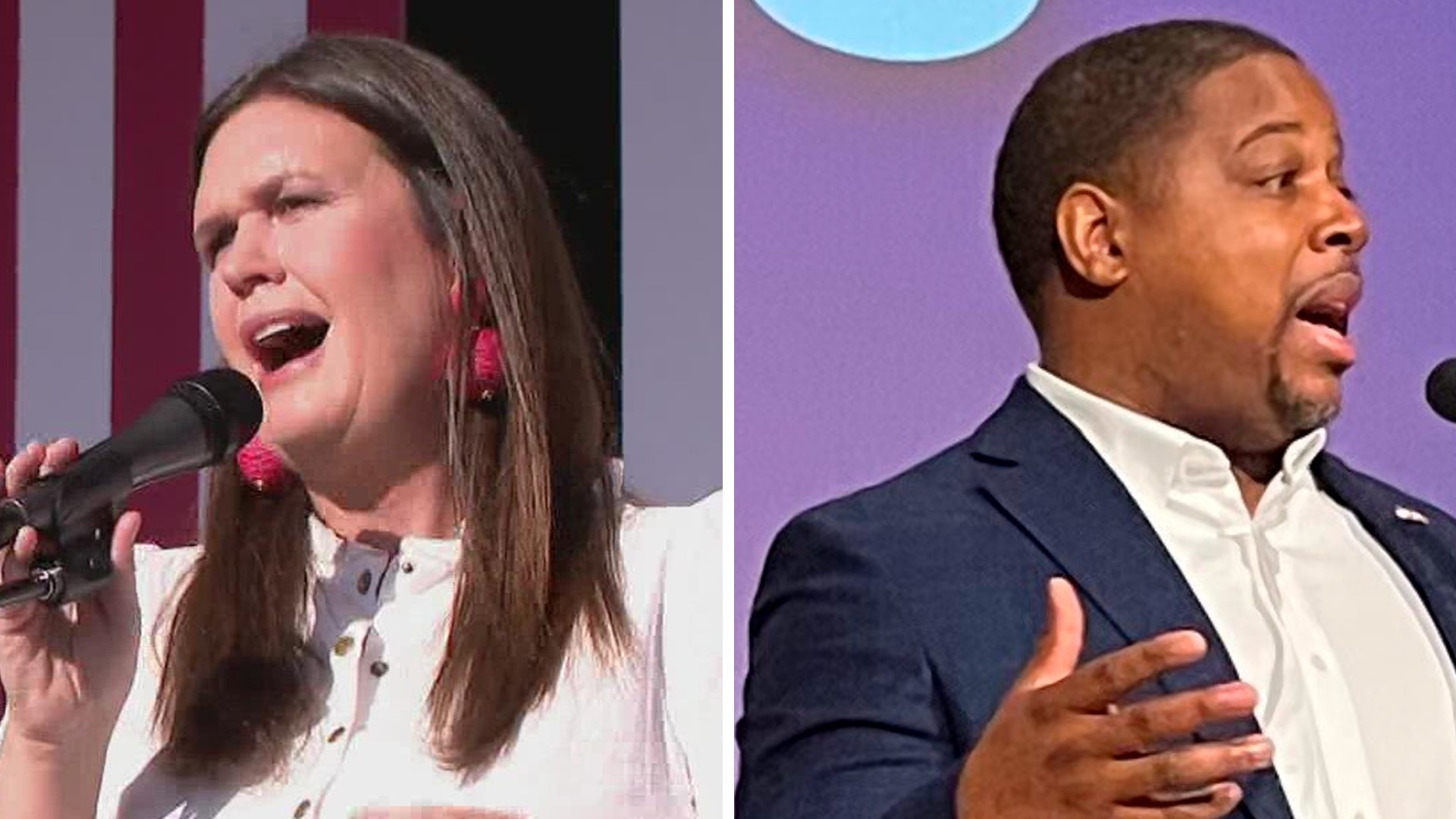Arkansas governor race | What to know before you vote
The Arkansas governor race in the 2022 midterm elections will be historic as voters will choose between Sarah Huckabee Sanders, Chris Jones, or other candidates.

Arkansas voters will make a historic decision on November 8, 2022 when they select the 47th governor of the state.
The latest polling shows that Sarah Huckabee Sanders (R) has an 11-point lead over Chris Jones (D) with 7% saying they are undecided in the race. A total of seven people are running in the race.
Early voting begins on October 24. Here's what you need to know before you vote.
But before you head to the polls, here is what you need to know about the candidates and what they've said about major issues and the four ballot issues that Arkansans can vote on.
Sarah Huckabee Sanders
Sarah Huckabee Sanders, the Republican candidate, has long been the frontrunner in the gubernatorial race. A graduate of Ouachita Baptist University and the daughter of former Governor Mike Huckabee, Sanders has been a fixture in the political sphere her entire career.
She has largely campaigned on her time as former President Donald Trump's press secretary where she was criticized for not holding press conferences. Sanders also admitted to investigators in the Mueller probe to making a false statement to the public as press secretary, which she called a "slip of the tongue."
In many of her campaign ads, Sanders has focused on her pledge to fight President Joe Biden and his administration's policies. She has promised to phase out the state income tax and reduce violent crime, but has not given specifics on her full agenda if she is elected as governor.
A major talking point among every race is the United States Supreme Court overturning Roe v. Wade, which triggered an abortion ban in Arkansas. In response, Sanders said she was "thankful" for the six justices for making the ruling.
She promised to keep Arkansas as "one of the most pro-life states in the nation."
Asa Hutchinson, Arkansas's outgoing governor, has endorsed Sanders along with other prominent state politicians like Senators John Boozman and Tom Cotton.
If elected, she would be the first woman to be elected to serve Arkansas as governor.
Chris Jones
Chris Jones, the Democratic candidate, is a graduate of both Morehouse College and MIT. At Morehouse, he got a Bachelor of Science in physics and math and then earned a Ph.D. in urban planning and became a nuclear engineer at MIT.
His campaign has focused on spreading "opportunity all over the state to help improve the lives of every Arkansan." On his website, Jones has detailed plans for education, infrastructure, healthcare, and the economy if he is elected.
Jones has a focus of expanding preschool, providing affordable broadband, and creating high wage jobs.
He called the overturning of Roe v. Wade "a dangerous precedent" and that women and doctors "should have control over their medical decisions." He said the ruling was an "all out assault" on women's rights and if elected he would "protect the rights of women."
In recent weeks, Jones has received national support from California Governor Gavin Newsom and other celebrities.
If elected, Jones would become the first Black man to become Arkansas governor.
Other candidates
Some of the other candidates include Libertarian Ricky Harrington Jr. and four write-in independent candidates.
The write-in candidates are: Dan Nelson, Jason Tate, Michael Woodard, and Elvis Presley.
Harrington Jr. is currently polling around 2% of the vote.
In 2020, Harrington ran against Senator Tom Cotton and received 33.5% of the vote. No Democrat ran in that race.
Presley, who has run in races across the state over the last few elections, previously ran as a Libertarian.
Ballot issues
Issue 1
Sanders noted some hesitation toward Issue 1, which would allow the state legislature to call itself into extraordinary sessions, but did not indicate how she would vote.
Jones, who is against Issue 1, said the proposed amendment would "alter the existing separation of powers" and that "we don't need more laws intended just to give more power to legislators."
Harrington is also against the measure, saying it would change "the separation of powers structure in the state."
"The legislature has a record of passing unconstitutional laws," he continued, "I do not support giving them more power."
Issue 2
The ballot measure would require any proposal to have at least 60% of the vote for a constitutional amendment or statutes to be adopted.
Jones has voiced opposition to the ballot issue, calling it an initiative "from legislators intent on giving legislators more power."
Harrington is also against the issue, calling it a "bad faith initiative."
But Sanders showed support for the ballot measure. She said that increasing the percentage is something that should be supported "across the board," according to the Arkansas Democrat-Gazette.
Issue 3
This amendment, proposed by the legislature, would make sure the "government shall not burden a person's freedom of religion even if the burden results from a rule of general applicability."
Harrington said that freedom of religion is "one of the foundations of American society" and that "the government has no place in abridging the religious rights of the people."
Jones, who is against the measure, said it would come with "several problematic unintended consequences by giving people a basis to challenge and exempt themselves from virtually any state law."
He said that the proposal would lead to boycotts and that the state already protects religious freedom within the current laws.
Sanders has not publicly indicated support or opposition to the issue.
Issue 4
Sanders will vote against legalizing marijuana in the state, according to the Arkansas Democrat-Gazette.
Harrington supports Issue 4, but has issues with the amendment. He hopes that if the measure passes, he would "work with the legislature to craft legislation that allows others to participate in the industry, so that it will be fair."
Jones is for the proposed amendment, calling it imperfect yet a step toward a "pragmatic cannabis policy" in Arkansas.
"Legalization will free up needed space in our overcrowded prisons to house truly dangerous criminals and refocus drug law enforcement on the dangerous fentanyl and opioid epidemic," he said. "A regulated industry will better protect children than the street drug dealer who will be put out of business."


